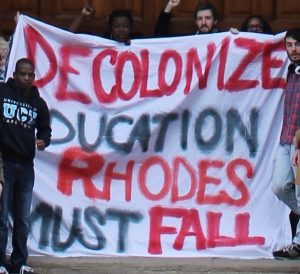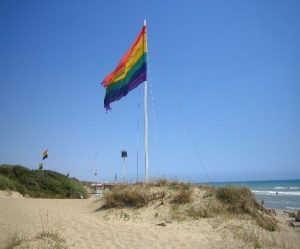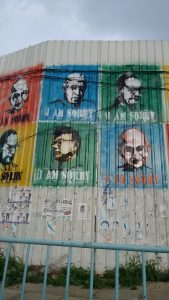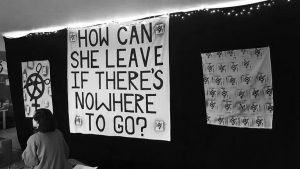 Photo source: visitlondon.com
Photo source: visitlondon.com
The Gender and Feminist Geographies Research Group (GFGRG) is sponsoring the following sessions at the RGS-IBG Annual International Conference, 29th August – 1st September, London
For the full abstracts and submission details see below.
The Costs of Decolonizing the Discipline
Convenors: Abigail Neely (Dartmouth College) and Patricia Lopez (Dartmouth College)
Submission deadline: Friday 3rd February 2017
Innovative research within Gender and Feminist Geography
Convenors: Eveleigh Buck-Matthews (Coventry University) and Heather Jeffrey (University of Bedfordshire)
Submission deadline: Wednesday 1st February 2017
Que(e)rying Gender and Tourism Research
Convenors: Eveleigh Buck-Matthews (Coventry University), Jaeyon Choe (Bournemouth University), Claudia Eger (University of Warwick), Heather Jeffrey (University of Bedfordshire) and Caroline Scarles (University of Surrey)
Extended deadline: Tuesday 14th February
Transformative Stories: Trauma, Therapeutic Geographies and Hope
Convenors: Jo Little (University of Exeter) and Lia Bryant (University of South Australia)
Extended deadline: Friday 10th February
Rethinking decolonial and postcolonial knowledges beyond regions
Convenors: Priti Ramamurthy (University of Washington) and Kiran Asher (University of Massachusetts)
Extended deadline: Wednesday 15th February
Safe space
Convenors: Janet Bowstead (Royal Holloway, University of London, RHUL), Katherine Brickell (RHUL), Mary Cobbett Ondiek (University of York) and Naomi Graham (RHUL)
Submission deadline: Tuesday 31st January 2017
The Costs of Decolonizing the Discipline
Session conveners: Abigail H. Neely and Patricia J. Lopez (Dartmouth College, New Hampshire, USA)
Session sponsor: Gender and Feminist Geographies Research Group (GFGRG)
In recent years there have been a number of calls and efforts to decolonize the discipline of geography. Stemming from a recognition of its colonial roots and their effects on who gets to produce and what counts as scholarly knowledge, a number of programs have sought to increase collaborations among scholars and institutions in the Global North and the Global South, with indigenous communities, and in conjunction with community-based social movements. Feminist geographers have taken the lead in many of these efforts to decolonize academic work, questioning the divisions between theory and empirics, praxis and knowledge, and taking their work beyond the university. But these lessons are rarely, if ever, incorporated into mainstream efforts of the discipline, as scholars and their collaborators often come up against the academy’s multiple neoliberal formations.
This RGS-IBG paper session seeks to examine how and why this marginalization takes place in an effort to imagine alternative emancipatory futures. We are looking for papers, rooted in experience, that address some of the barriers to decolonizing geographic knowledge. We ask: What are the ways in which scholars are disciplined to reproduce knowledge from the Global North? What counts as decolonizing knowledge? What counts as knowledge from the South? Where is the South? Whose work counts as knowledge production in geography? Our questions are designed to open up conversations in multiple directions, linking multiple sites. We imagine these papers might include such diverse topics as: decolonizing the classroom and new pedagogical methods; challenges to publishing work produced through new collaborations; activism on campuses and beyond, etc. We welcome paper proposals on different topics as well.
If you are interested in presenting a research paper, please send titles and abstracts of approximately 250 words to Abigail Neely abigail.h.neely@dartmouth.edu and Patricia Lopez patricia.j.lopez@dartmouth.edu by 3rd February 2017.
Innovative research within Gender and Feminist Geography
Session convenor: Eveleigh Buck-Matthews (Centre for Trust, Peace & Social Relations, Coventry University) and Heather Jeffrey (University of Bedfordshire)
Session sponsor: Gender and Feminist Geographies Research Group (GFGRG)
These sessions are aimed at postgraduates and early career researchers who would like an opportunity to present their research in a supportive academic environment, and at researchers at all stages of their careers that are interested in presenting papers that actively engage with discussions on methodological innovations in the field of feminist and gender geography.
‘Gender and Feminist Geographies’ is intended to cover a broad spectrum of research; papers are welcome from any area of feminist and gender geographical inquiry, with the aim of bringing together current and emerging themes, issues and approaches. Papers would are especially welcome that explore how both postcolonial and de-colonial thinking may shape research methods, in line with this year’s conference theme.
Researchers at any stage in their research process are welcome, making the session a great opportunity for early career and post-graduate researchers to get experience presenting their work to an encouraging audience. The sessions will provide a great space to meet and discuss ideas with other researchers in a friendly and relaxed environment.
We are currently seeking contributors for the following sessions:
Sessions 1: Paper presentations: involving five presentations each lasting around 15 minutes with time for questions
Sessions 2: Snapshot presentations: involving ten to fifteen presentations each lasting 2 minutes with the option to use pictures, which will be followed by an open discussion. Whilst this session is open to anyone, we hope it will provide opportunity to those not ready to present full papers to engage in the conference and get feedback on their research ideas. This session is also suitable to those wishing to explore the possibilities and relevance of gender and feminist theory to their research.
Please send abstracts (approx. 250 words) and indication of preferred session to Heather Jeffrey Heather.Jeffrey@beds.ac.uk by February 1st 2017.
Que(e)rying Gender and Tourism Research
Extended deadline: Tuesday 14th February
Session convenors: Eveleigh Buck-Matthews (Coventry University), Dr Jaeyon Choe, (Bournemouth University), Dr Claudia Eger (University of Warwick), Heather Jeffrey (University of Bedfordshire) and Dr Caroline Scarles (University of Surrey)
Session sponsors: Geographies of Leisure and Tourism Research Group (GLTRG) and Gender and Feminist Geographies Research Group (GFGRG)
There is a growing body of knowledge concerned with gender and tourism, but still many voices remain unheard. Feminists are as varied as the subjectivities they so often research, but are joined together within a common emancipatory project. Queer theory can aid in an emancipatory project by destabilising foundational assumptions of normality (de Souza, Brewis & Rumens, 2016; Rumens & Tyler, 2016), and yet it has received little attention from tourism scholars. This session is designed to engage participants in a critical conversation on gender and feminism within tourism, hospitality and events research, to explore contentious issues among feminists and pave the way for collaboration. Papers concerning any aspect of gender within tourism, hospitality and events research are invited, as well as papers investigating multiple voices and perspectives within gender and tourism, which may relate to but not be confined by the following areas:
- Female hosts as guests and the reification of roles
- Masculinities in tourism, hospitality, and events
- LGBTQ voices in tourism, hospitality, and events
- Casual/precarious gendered workers
- Postcolonial feminism and subaltern studies in tourism
- Insights from queer theory for gender and tourism
- Feminist theory and practice
We are currently seeking contributions for a paper presentation session involving five presentations each lasting around 15 minutes with time for questions. The presentation may be executed in a traditional or innovative style, and we actively encourage a wide range of styles; including snapshots and pechakucha.
Please send abstracts (approx. 250 words) with author contact details to Heather Jeffrey heather.jeffrey@beds.ac.uk
Transformative Stories: Trauma, Therapeutic Geographies and Hope
Extended deadline: Friday 10th February
Session conveners: Jo Little (University of Exeter) and Lia Bryant (University of South Australia)
Session sponsors: Gender and Feminist Geographies Research Group (GFGRG) and Geographies of Health and Wellbeing Research Group
Geographers have become very familiar with the use of story telling as a methodology for engaging with the everyday detail of people’s lives, for giving voice to those ignored in the research process and for highlighting the importance of emotion in geographical understanding. Feminist geographers in particular have drawn on stories to articulate powerlessness and exclusion. The telling and re-telling of stories is encouraged as therapeutic to the story teller and as transformative in harnessing a politics of hope. As has been observed, however, there are risks involved in the telling of traumatic stories. As Parr and Stevenson (2014) note, there is always a fear that such stories may render the researcher complicit in promoting a voyeuristic interest which could help create and reinforce ‘wound cultures’, valorizing trauma and encouraging the re-circulation of stigma. In this session we wish to explore the transformative potential of stories and look at ways in which stories and storytelling uncover new geographical insights into difficult lives. We wish to draw attention, potentially, to the unpredictable nature and outcomes of story telling both for the subject and the researcher.
Possible papers might explore:
- Stories, pain and emotion
- Gender, story telling and feminist methodologies
- Stories of violence and abuse
- Hopeful stories and the role of stories in transformative politics
- Concerns about audiencing and the ‘use’ of difficult stories
- The potential of storytelling in understanding different worlds
- Wellbeing and the therapeutic role of storytelling
Please send offers of papers (titles and abstracts of 300 words) to Jo Little j.k.little@exeter.ac.uk
Rethinking decolonial and postcolonial knowledges beyond regions
Extended deadline: Wednesday 15th February
Session convenors: Priti Ramamurthy (University of Washington) and Kiran Asher (University of Massachusetts)
We seek to rethink “regions” as theoretical sources and facilitate a “South-South” exchange and critical dialogue about what post- and de-colonial feminisms as “anti-colonial” approaches bring to geographical knowledges in two roundtables sponsored by GFGRG. The conference Decolonizing Geographical Knowledges: Opening geography out to the world, supposes that “western” geographical knowledges need to be decolonized. While this remains a worthy cause today, it continues to hold the “west” at the center of knowledge production. This centrality has been questioned by approaches concerned with the decolonization of knowledge. Decolonial and postcolonial feminisms foreground how raced and gendered colonial practices constituted “Eurocentric” or modern forms of knowledge production which marginalize other forms of knowing and being in the world. Decolonial feminism has been associated with scholars of settler colonialism in Latin America and the Caribbean, and more recently North America. On the other hand postcolonial feminism has been linked with scholarship on the politics of representation, hybridity and migration regionally associated with South Asia, the Middle East and Africa. Postcolonial approaches are understood to be “deconstructive,” while decolonial ones are commonly thought to be “constructive” or solution oriented.
We invite scholars of decolonial feminisms in Latin America, the Caribbean, Europe and North America to send a one-para description of why they would like to participate and a brief bio to the session convenors: Kiran Asher kasher@umass.edu and Priti Ramamurthy priti@uw.edu
Safe Space
Session conveners: Janet Bowstead (Royal Holloway, University of London, RHUL), Katherine Brickell (RHUL), Mary Cobbett (University of York) and Naomi Graham (RHUL)
SAFE SPACE
‘A place or environment in which a person or category of people can feel confident that they will not be exposed to discrimination, criticism, harassment, or any other emotional or physical harm’.
‘school must be a safe space for LGBT students’
‘her shows are described as safe spaces where crying is acceptable and even encouraged’
‘women’s refuges provided a safe space for victims of domestic violence’
(English Oxford Living Dictionary, 2016)
In the RGS-IBG conference sessions, we wish to open up critical discussion on ‘safe space’ – a label and practice which in 2016 has attracted celebration, derision and controversy at the highest of political levels. We contend that safe space raises a series of urgent academic questions of relevance across sub-fields of geography. How is safe space imagined, designated, deployed, materialised, co-opted, and experienced by different actors, institutions and governments? What are the positive as well as putative effects of safe space in its multiple guises? How are safe spaces materially and/or emotionally manifest, maintained and endangered? What power geometries do safe spaces exclude and harbour? What are the (shifting) everyday geopolitics of safe spaces?
Our call is deliberately broad, with suggestions including but not limited to: the origins and lineage of the concept; ‘women-only’ and ‘girl-only’ spaces, programmes and interventions; queer safe spaces of belonging and community; schools, university campuses and pedagogy; safe havens and sanctuary cities; safe refuges from violence (domestic violence shelters, panic rooms etc.), war and destruction (the bunker, hospital etc.); digital safe spaces (‘Hugbox’ internet environments and cyber/space safety).
We are looking for titles and abstracts of 300 words to be sent to Janet Bowstead Janet.Bowstead@rhul.ac.uk by 31st January 2017.





